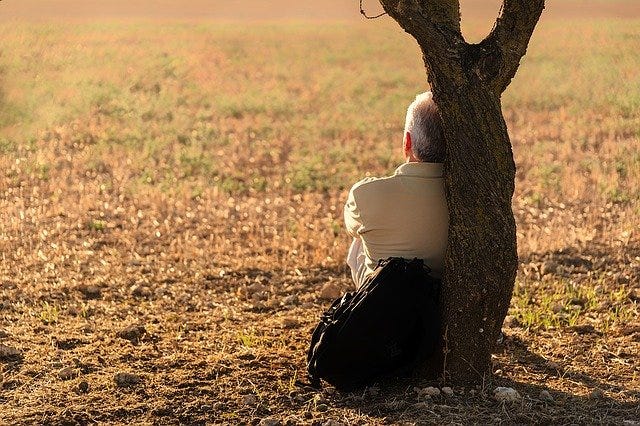In a survey I conduct of family caregivers about their compassion fatigue, family caregivers share that solitude — time for themselves — energizes them.
The need for solitude during a loud experience like caregiving makes sense. The noises of caregiving are the thoughts in our head, the busyness of the day, the pounding of our feet and our hearts. Others may not heard these sounds, especially the noise of our guilty and impatient thoughts, but we do.
The break from the noise lets us recover.
The need for solitude also makes sense because of the constant requests and the never-ending demands of our day we meet. We feel surrounded by needs — our caree, our employer, our family, our pets, our house.
The break from meeting all these needs lets us relax.
In addition, the need for solitude also makes sense because we wear our “I’m fine” face throughout the chaos, the crises, the upsets. When we wake up into a day that brings another change and another decline, we put on the “‘We’re fine” face. When we hear more bad news and worry about what could happen next, we put on the “I’m fine” face. We’re fine because we want everyone else to be fine.
The break from pretending lets us feel.
When we understand that family caregivers need time for themselves, we can be more deliberate in the types of respite programs we offer. Sometimes, a family caregiver needs the house to himself in order to enjoy solitude. Sometimes, a family caregiver needs time away from the house to find that solitude. Sometimes, she just needs a place in her house that gives her solitude while the rest of the house stays noisy. Sometimes, she needs her own peaceful space in her house so she can pursue her dream.
Often, respite programs just solve the first two options. A caree may attend an adult day program so the family caregiver has the house to himself. A caree may receive in-home services so that the family caregiver can leave. Rarely, though, do respite programs provide that family caregiver a budget to create a different kind of respite — her own space in her own home to create her own kind of solitude and to achieve her own goals.
Breanne Bruce, who cares for her four-year-old son, recently completed our Certified Caregiving Consultant training in her home. Our coursework provided her the break she so needed. She calls the immersion in the course’s material and requirements her break from caregiving. She values personal development and being of service to others. Her respite from caregiving with our training program helped her accomplish both.
What if all respite programs made all kinds of breaks possible? What if respite programs gave family caregivers the freedom to be, to dream, to achieve, to truly be themselves? In my family caregiver stress survey, family caregiver say that they miss their lives, which leads to their stress.
When we have the right kind of respite programs, we ensure all family caregivers live their lives during their life of caregiving. We resolve their stress and heal their compassion fatigue. We give to them so they can receive.
(Photo source: https://pixabay.com/users/josealbafotos-1624766/)
Updates
Enjoy a free download of my Kindle book, Caregiving Lists of Your Courage, Hope and Resilience through April 14.
Pre-order my newest book, Healing Words, which helps family caregivers heal from their caregiving fatigues.
Tell me about your compassion fatigue and your caregiving stress.
Please sure to subscribe to receive our Caregiving Reflections on Sundays.




